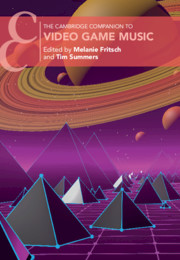Book contents
- The Cambridge Companion to Video Game Music
- Cambridge Companions to Music
- The Cambridge Companion to Video Game Music
- Copyright page
- Contents
- Figures
- Tables
- Musical Examples
- Contributors
- Preface
- A Landmark Timeline of Video Game Music
- Foreword: The Collaborative Art of Game Music
- Introduction
- Part I Chiptunes
- Part II Creating and Programming Game Music
- Part III Analytical Approaches to Video Game Music
- Part IV Realities, Perception and Psychology
- 15 A Step Back from Reality: Sound and Presence in Computer Games and Other Worlds
- 16 Audio and the Experience of Gaming: A Cognitive-Emotional Approach to Video Game Sound
- 17 Psychophysiological Approaches to Sound and Music in Games
- Part V Game Music, Contexts and Identities
- Part VI Beyond the Game
- 24 Producing Game Music Concerts
- Select Bibliography
- Index
- References
17 - Psychophysiological Approaches to Sound and Music in Games
from Part IV - Realities, Perception and Psychology
Published online by Cambridge University Press: 15 April 2021
- The Cambridge Companion to Video Game Music
- Cambridge Companions to Music
- The Cambridge Companion to Video Game Music
- Copyright page
- Contents
- Figures
- Tables
- Musical Examples
- Contributors
- Preface
- A Landmark Timeline of Video Game Music
- Foreword: The Collaborative Art of Game Music
- Introduction
- Part I Chiptunes
- Part II Creating and Programming Game Music
- Part III Analytical Approaches to Video Game Music
- Part IV Realities, Perception and Psychology
- 15 A Step Back from Reality: Sound and Presence in Computer Games and Other Worlds
- 16 Audio and the Experience of Gaming: A Cognitive-Emotional Approach to Video Game Sound
- 17 Psychophysiological Approaches to Sound and Music in Games
- Part V Game Music, Contexts and Identities
- Part VI Beyond the Game
- 24 Producing Game Music Concerts
- Select Bibliography
- Index
- References
Summary
Psychological research investigating sound and music has increasingly been adapted to the evaluation of soundtracking for games, and is now being considered in the development and design stages of some titles. This chapter summarizes the main findings of this body of knowledge. It also describes the application of emotional measurement techniques and player responses using biophysiological metering and analysis. The distinction between different types of psychophysiological responses to sound and music are explored, with the advantages and limitations of such techniques considered. The distinction between musically induced and perceived emotional response is of particular relevance to future game design, and the use of biophysiological metering presents a unique opportunity to create fast, continuous control signals for gaming and game sound to maximize player experiences. The world of game soundtracking also presents a unique opportunity to explore sound and music evaluation in ways which traditional musicology might not offer (for example, deliberately antagonistic music, non-linear sound design and so on). The chapter concludes with directions for future research based on the paradigm of biofeedback and bio-controlled game audio.
- Type
- Chapter
- Information
- The Cambridge Companion to Video Game Music , pp. 302 - 318Publisher: Cambridge University PressPrint publication year: 2021
References
Further Reading
- 1
- Cited by



